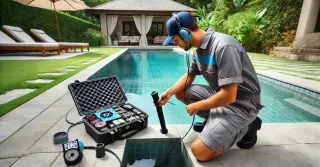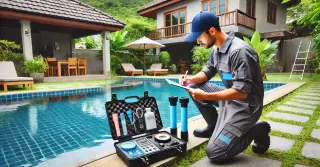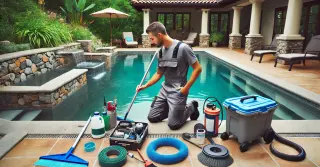Pool Leak Detection Glassboro NJ

Professional pool leak detection employ thorough techniques to find and repair water leaks. Leaks may happen in several parts of the pool, including the pool shell, plumbing, and fittings.
- Sound-Based Leak Detection: One of the key tools used in pool leak detection is the acoustic leak detector. These instruments enhance the sound of water leakage, making it easier to locate the leak. Through these instruments, professionals can precisely locate the leak, even if it's in hard-to-reach areas.
- Hydrostatic Pressure Testing: Pressure testing is another effective method for identifying leaks in the plumbing and fixtures of the pool. This method involves pressurizing sections of the plumbing and monitoring for pressure loss. If there's a pressure drop, it indicates a leak, which can then be exactly identified and repaired.
Color-Based Leak Detection and InspectionUsing dye and visual inspection are traditional but effective methods for identifying leaks in pools. These techniques are straightforward but effective in locating leaks.
- Utilizing Leak Detection Dyes: Experts apply specialized dyes to monitor water movement. The dye is placed near suspected leak sites, and if a leak is present, the dye will move towards it. This technique helps visually pinpoint leaks in a straightforward manner.
- Careful Visual Examination: Along with dye testing, a thorough visual inspection is performed to detect signs of leaks. This includes checking for wet spots around the pool area, cracks in the pool surface, and water loss in the pool. Visual inspection can often reveal issues that other methods might miss, making it a crucial step in leak detection.
Preventive Measures and Regular MaintenanceProactive maintenance and preventive steps are crucial for preventing leaks and preserving pool condition. Frequent checks and timely repairs can save you from costly damages and extensive water loss.
- Regular Professional Inspections: Engaging professionals for regular inspections can detect issues before they escalate. Technicians can check for early signs of wear and tear, minor leaks, and other vulnerabilities. Fixing these problems early avoids bigger repair needs and extends the life of your pool.
- Maintaining Optimal Water Chemistry: Ensuring proper water balance is essential for avoiding leaks. Incorrect water chemistry can damage surfaces and equipment, leading to leaks. Regularly testing and adjusting water chemistry keeps the pool in good condition and prevent issues that could lead to leaks.
Professional pool leak detection keep your pool in optimal condition by finding and fixing leaks efficiently. Routine care and preventive actions are essential for maintaining a leak-free pool for years to come.




